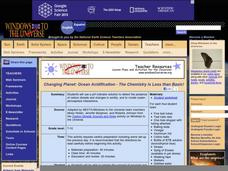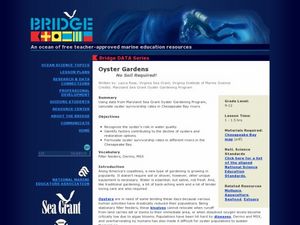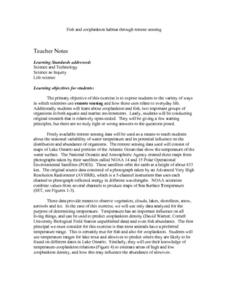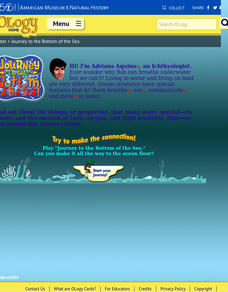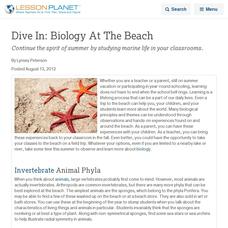Curated OER
Saving Sturgeon
Marine biology apprentices interpret data of sturgeon interaction with gill nets. They use the data to calculate the percentage of fish entangled in each twine size to discover if there is any correlation. This is a valuable exercise in...
NOAA
Importance of Deep-Sea Ecosystems – Chemists with No Backbones
Marine invertebrates offer us many new options for developing pharmaceutical drugs, such as w-conotoxin MVIIA, which is extracted from the cone snail and is a potent painkiller. The activity encourages scholars to research various types...
Curated OER
Changing Planet: Ocean Acidification - the Chemistry is Less than Basic!
A video and laboratory investigation are highlights to this lesson plan on acidification of ocean water due to increased atmospheric carbon dioxide. Using bromothymol blue (BTB) as an indicator, pupils analyze the amount of carbon...
Curated OER
Chilean Sea Bass
Introduce your mini-marine biologists to using databases. Tables of how many Chilean Sea Bass were caught and number of hours spent fishing are examined. Using the data, individuals calculate the "Catch per Unit of Effort" for each year....
Curated OER
Oyster Gardens - No Soil Required!
Explore the practice of oyster gardening. Because oysters play a vital role in marine ecosystems and their populations have declined, biologists are transplanting oyster seed to repopulate reefs. After learning about this practice,...
California Academy of Science
Banishing Bycatch
Bycatch is a sad reality for many sea turtles, dolphins, and sharks; it occurs when they get unintentionally caught in commercial fishing nets. The class plays a game using popcorn and crackers, each child will attempt to catch the...
NOAA
Ocean Exploration
Where am I? The second installment of a 23-part NOAA Enrichment in Marine sciences and Oceanography (NEMO) program starts with pupils guessing the years in which major ocean exploration events took place. The lesson then focuses on how...
NOAA
Technology II
Ping, ping, ping. The last installment of a 23-part NOAA Enrichment in Marine sciences and Oceanography (NEMO) program explores technology use in marine studies, such as sonar. Activity involves simulating sonar techniques to identify a...
Curated OER
Fish and zooplankton habitat through remote sensing
Young scholars are exposed to the variety of ways in which scientist use remote sensing and it used in everyday life. They investigate about zooplankton and fish. Students list the two important groups of organisms in both aquatic and...
US National Archives
WWII: The Pacific 1939-45 – Iwo Jima
Of the images that have permeated history to define American courage, perseverance, and patriotism, the 1945 photograph of United States Marines raising the flag at Iwo Jima is one of the most well known. After researching the pivotal...
Curated OER
Blue Crabs - The Blue Crab's Chesapeake Journey
A plethora of information about the blue crabs of Chesapeake Bay will amaze and delight your marine biologists. They learn, through direct instruction, about the characteristics and life cycle of this fascinating arthropod. A highlight...
Biology Junction
Cnidarians and Ctenophorans
Cnidaria is a broad phylum of 11,000 different species from jellyfish to coral. Most Cnidarians are marine species with a few freshwater examples. A lesson presentation explains the important characteristics of different species of...
American Museum of Natural History
Journey to the Bottom of the Sea
Properties of water make it essential for the life of marine species. Learners complete an online game to answer questions about the role water fulfills for organisms in ocean habitats. The game emphasizes the properties of water and how...
Rainforest Alliance
How Do Jaguars and Howler Monkeys in Belize Depend on Us?
How does weather play a role in the lives of land and sea creatures? Find out with a lesson focused on habitats and the ways animals from different homes are connected. Here, learners explore how the life of a jaguar and howler...
Rainforest Alliance
Protecting the Critical Habitat of the Manatee and Loggerhead Turtle
Explore ocean habitats with a lesson that showcases the home of manatees and loggerhead turtles in Belize. Here, pupils compare and contrast the homes of ocean animals to those of humans, listen to an original short story about...
NOAA
The Dead Zone
The fifth installment of a 23-part NOAA Enrichment in Marine sciences and Oceanography (NEMO) program defines dead zones and how they form. Pupils then examine data from the Gulf of Mexico to determine dead zone formation.
NOAA
What Killed the Seeds?
Can a coral cure cancer? Take seventh and eighth grade science sleuths to the underwater drugstore for an investigation into emerging pharmaceutical research. The fifth installment in a series of six has classmates research the wealth of...
Curated OER
Sponge-Painted Ocean Mural
I love big mural projects. They bring a sense of ownership to the classroom, look great for parents, and can be a great way to complete a unit. Here are the steps and suggestions needed to create an ocean mural for your class. Learners...
Curated OER
Egg Carton Lobsters
Who doesn't love learning about the ocean? And who wouldn't want to help create an ocean themed mural? Little learners make lobsters out of recycled egg cartons, pipe cleaners, and paint. These are then used as part of a larger 3-D ocean...
Curated OER
Coral Bleaching in the Caribbean
Students practice analyzing images, maps and graphs from Internet-based educational resources. They explore the correlation between sea surface temperature and coral bleaching. Students comprehend that coral reefs are collections of tiny...
Curated OER
Dive In: Biology At The Beach
Continue the spirit of summer by studying marine life in your classrooms.
ARKive
Dinner at the Reef
Fine dining can happen anywhere, even in the coral reefs. Budding environmentalists explore marine food chains, predator-prey relationships and the importance of a balanced ecosystem. These important concepts are facilitated through a...
Institute of Electrical and Electronics Engineers
Fun with Speedboats!
After reading about marine engineers and naval architects, it's all hands on deck to design and test a speed boat. This activity is designed for the Next Generation Science Standards in engineering and can be a centerpiece for a STEM...
NOAA
Introduction to the Ocean Sciences
Engage your class with a mock National Ocean Sciences Bowl. The first installment of a 23-part NOAA Enrichment in Marine sciences and Oceanography (NEMO) program provides an introduction to the ocean sciences, as well as to the rules of...




